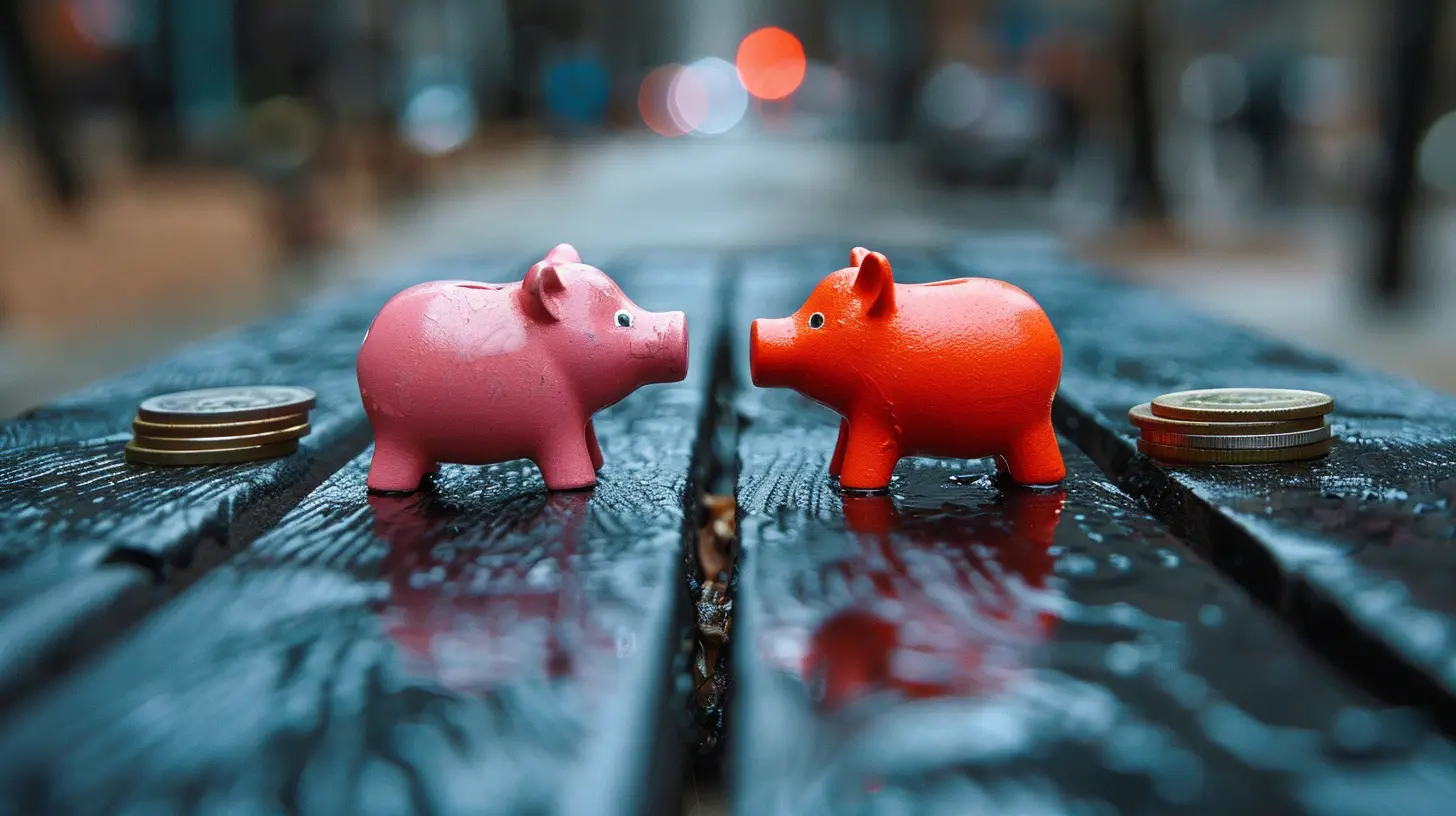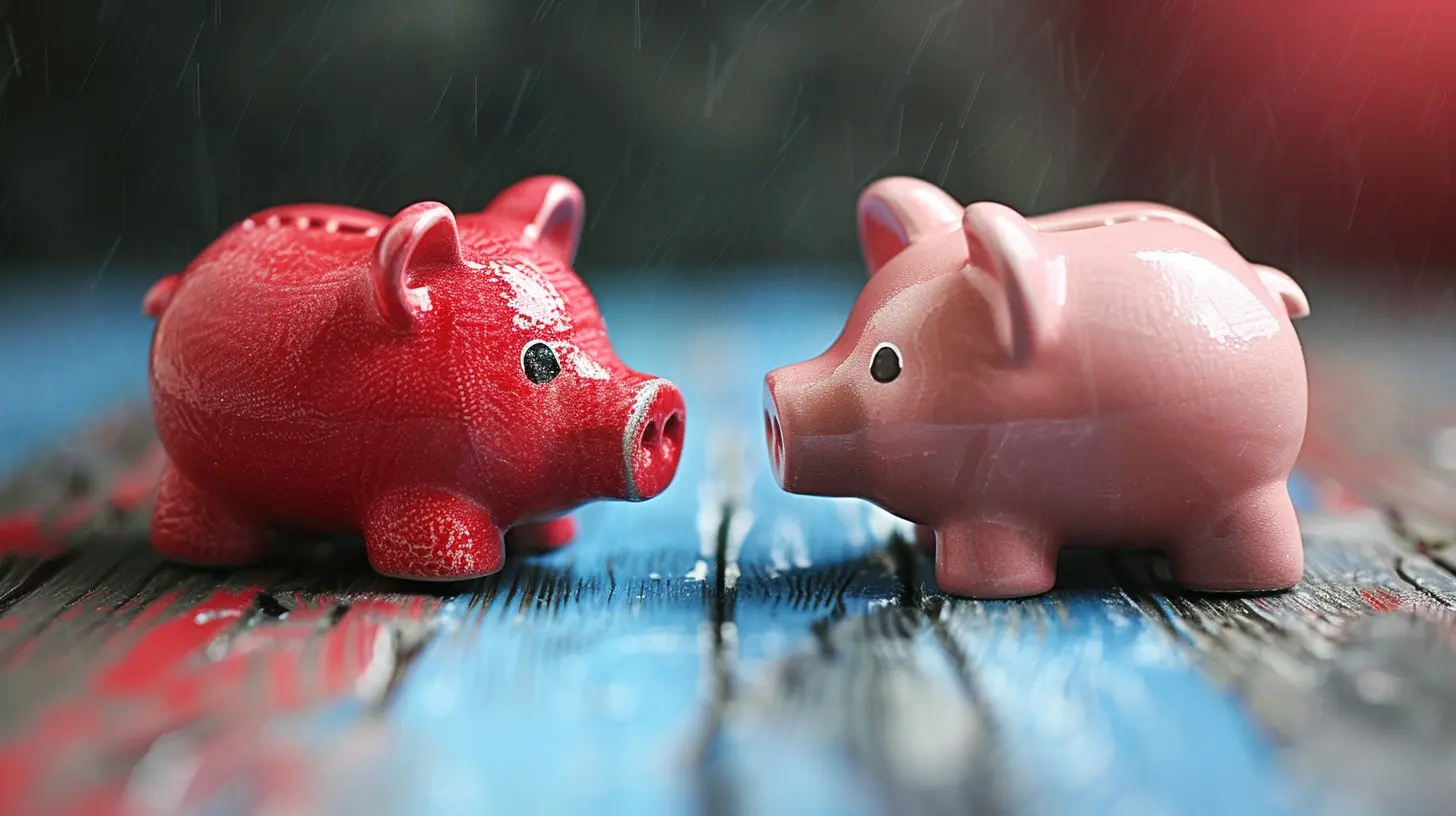Understanding Inflation vs. Recession and How to Combat Both
18 August 2025
Let’s face it—money makes the world go ‘round, but sometimes it spins a little too fast or slows down to a crawl. That’s where these two economic powerhouses come in: inflation and recession. They’re like opposing weather patterns on the financial forecast—one heats up prices while the other sends cold chills through the job market and GDP.
But what exactly are they? How do they impact your wallet, your job, your savings, your investments—heck—even your grocery bill? More importantly, is there anything you can actually do to fight back?
Grab a cup of coffee, sit back, and let’s unravel the tangled threads of inflation and recession, and how you, yes—you—can navigate both without losing sleep or sanity.
What Is Inflation? (And Why It Feels Like Your Money Is Shrinking)
Have you ever noticed how a dollar just doesn’t stretch like it used to? You’re not imagining it. That’s inflation in action.Inflation happens when prices rise across the board—food, rent, fuel, pretty much everything you spend money on. But here’s the kicker: while prices go up, your money’s purchasing power goes down. It’s kind of like blowing up a balloon—everything expands, but it gets thinner and weaker.
Common Causes of Inflation
- Demand-Pull Inflation: Too much money chasing too few goods. Think of it like Black Friday—when everyone wants the same TV, prices soar.- Cost-Push Inflation: When the cost of producing goods goes up (due to wages, materials, etc.), those costs get passed down to you.
- Built-In Inflation: When businesses expect rising costs, they hike wages, which then leads to...yep, more price hikes.
A little inflation isn’t bad. In fact, it’s pretty normal—central banks like the U.S. Federal Reserve aim for around 2% annually. But when it spikes? That’s when your savings start sweating.
What Is a Recession? (And Why It Feels Like an Economic Winter)
Now, let’s talk about the colder side of the economy: a recession.At its core, a recession is a significant decline in economic activity. Jobs are lost. Businesses close. Consumers stop spending. It’s the financial equivalent of a winter storm—frightening and full of uncertainty.
How Do Recessions Happen?
- High Inflation: Sometimes the medicine for inflation (like raising interest rates) causes the whole economy to slow down too much.- Financial Crises: Like the 2008 meltdown—banks tighten credit, businesses fold, people panic.
- Global Events: Think pandemics, wars, supply chain disruptions—they often act as triggers.
Recessions don’t just hurt numbers on a chart. They hit people—families, communities, workers. It’s millions of quiet stories about layoffs, budget cuts, and tough decisions.
Inflation vs. Recession: What’s the Difference?
Inflation and recession might hang out in the same economic neighborhood, but they’re definitely not twins.| Feature | Inflation | Recession |
|--------|-----------|-----------|
| Prices | Rising | Falling (or stagnating due to lack of demand) |
| Employment | Often strong (in early stages) | Declining |
| Spending | High (sometimes too high) | Very low |
| Economic Outlook | Overheating | Cooling down |
| Central Bank Response | Raise interest rates | Lower interest rates |
It’s a bit ironic, right? The solution for one often sparks the other. It’s like playing economic whack-a-mole—fix inflation, risk recession. Fix recession, fuel inflation. That’s why economists have gray hair and coffee addictions.
How Inflation Impacts Everyday Life
Let’s bring this home—literally.Your Grocery Bill Grows
Cheese used to be $3 a bag. Now it’s $5. Multiply that across your entire shopping cart and suddenly, your weekly budget takes a serious hit.Borrowing Gets Pricier
To fight inflation, central banks hike up interest rates. Suddenly, your mortgage, car loan, or credit card APR isn’t looking so friendly.Savings Lose Value
Got cash stashed under a mattress or in a low-interest savings account? Inflation is silently eating it. What $100 bought last year only gets you $95 worth today.How Recession Impacts Everyday Life
While inflation chips away at your budget, recession is more of a sledgehammer.Job Uncertainty
Businesses cut costs—and sadly, that often means layoffs or hiring freezes. You might feel stuck in your job, even if it’s not your dream gig.Investment Volatility
The stock market doesn’t love bad news. And during recessions, it throws tantrums—big swings, losses, and fear-driven selling.Lower Consumer Confidence
People clutch their wallets tighter. Vacations, home renovations, even eating out take a backseat.How to Combat Inflation (Without Losing Your Cool)
Inflation is sneaky, but not unstoppable. Here are some down-to-earth moves to keep it from draining your wallet:1. Budget Like a Boss
Now’s the time to track every dollar. Use an app or a simple spreadsheet—whatever works. Look for subscriptions you forgot about or expenses you can cut back. Every penny counts.2. Consider Inflation-Resistant Investments
Think Treasury Inflation-Protected Securities (TIPS), commodities like gold, or even real estate. They have a better shot at keeping pace with rising prices.3. Increase Income (Even a Little)
Side gigs, freelance work, or a part-time hustle can help balance out rising costs. The internet has made earning extra cash more accessible than ever.4. Pay Down Debt
Rising interest rates make debt more expensive. Prioritize paying off high-interest credit cards and loans before they balloon out of control.How to Combat Recession (While Keeping Your Sanity Intact)
Recessions can feel like quicksand—but there are ways to keep your footing.1. Beef Up Your Emergency Fund
Aim for 3–6 months of expenses. If that feels overwhelming, start small. Even $500 can be a financial life jacket.2. Diversify Your Income
If your industry is shaky during downturns, consider ways to expand your skills or income streams. Don’t put all your financial eggs in one paycheck basket.3. Avoid Big Purchases (If Possible)
Think twice before buying a new car or taking on large debt. Recession often brings uncertainty—stability is the name of the game.4. Don’t Panic-Sell Investments
Watching your portfolio drop is tough. But remember: downturns are temporary, and history shows that markets rebound. Panic selling only locks in your losses.5. Upskill or Reskill
Use quiet times to learn new skills that might make you more employable or open doors to higher-paying fields. Online courses are everywhere, and many are free.How Do Governments Fight Inflation and Recession?
Let’s not forget the big players: central banks and governments. They’ve got financial levers we don't.Fighting Inflation
- Raising Interest Rates: Makes borrowing more expensive, slowing down spending.- Reducing Money Supply: Sells government securities to soak up excess cash.
- Verbal Guidance: Sometimes even just talking tough on inflation can calm markets.
Fighting Recession
- Lowering Interest Rates: Encourages borrowing and investment.- Quantitative Easing: Injects money into the economy to stimulate growth.
- Stimulus Checks and Spending: Governments inject cash directly to households and fund job-creating programs.
So, Which One Is Worse?
That’s the million-dollar question. And honestly? It depends on who you ask.Inflation erodes your purchasing power. But for those with assets like homes or stocks, it might not sting as much.
Recession, on the other hand, leads to job loss, financial stress, and economic contraction. That’s pain many find harder to bear.
Ideally, we want a Goldilocks economy—not too hot, not too cold—just right. But since that’s not always in the cards, being prepared for either scenario is your best bet.
Final Thoughts: Control What You Can, Ride Out What You Can’t
Inflation and recession are just parts of the economic life cycle. They come and go like seasons—each with its own storms and sunshine.Will they affect you? Probably. But can you fight back? Absolutely.
Track your spending. Grow your income. Educate yourself. Invest wisely. And perhaps most importantly—don’t let fear paralyze you. Financial literacy is the shield, and smart action is your sword.
So whether it’s inflation’s summer heat or recession’s winter frost—remember, you’ve got this.
all images in this post were generated using AI tools
Category:
Recession PreparationAuthor:

Zavier Larsen
Discussion
rate this article
1 comments
Scarlett Soto
This article offers a clear distinction between inflation and recession, along with practical strategies to mitigate their impacts. It's essential reading for anyone looking to navigate today's complex economic landscape effectively.
August 28, 2025 at 2:42 AM

Zavier Larsen
Thank you for your feedback! I'm glad you found the article helpful in navigating these important economic concepts.


